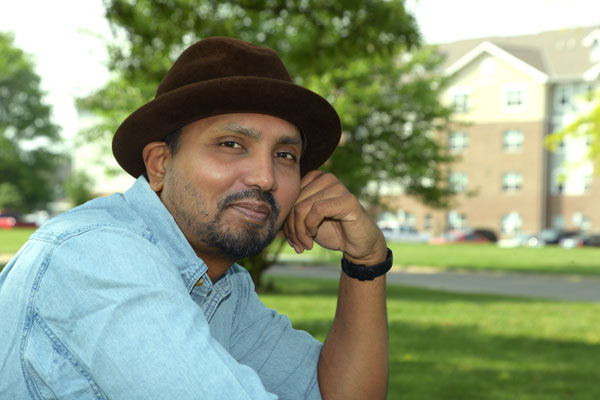Hand in hand
Felix Fernando doesn’t subscribe to the oft-quoted philosophy, “If you build it, they will come.”
“That’s a top-down mentality that says, ‘We know the solution, and here it is.’ In the work we do, it’s up to the community to be co-creators,” says Fernando, assistant professor of sustainability and a Fitz Center Faculty Fellow.

Over the next two years, Fernando and Hanley Sustainability Institute students will work hand in hand with Dayton View Triangle neighbors to build a community garden from scratch on a portion of a 30-acre parcel that once housed the United Theological Seminary. Omega Community Development Corp. is reimagining the property, which now features a senior housing complex and the Hope Center for Families. Sprouting out of what Fernando calls “blessed ground,” the vegetable garden will take root here in one of Dayton’s food deserts and provide fresh produce to the neighborhood.
Sprouting out of what one faculty member calls “blessed ground,” the vegetable garden will take root on land that once housed a seminary.
Elsewhere in northwest Dayton, Mary Fuhs and her child psychology students are assessing the school readiness skills of children at early childhood education centers that employ higher-paid teachers. It’s part of a larger project involving faculty across different disciplines and a number of community partners, including Preschool Promise, Northwest Dayton Partnership and Learn to Earn.
“My field has historically been criticized for focusing too much on the individual and not enough on the contexts in which children develop, which leads to enormous limitations in generalizing research findings to the broader population,” says Fuhs, an associate professor of psychology who studies cognitive development in young children. “The solution to opportunity gaps in children’s school readiness skills lie not in designing an even more tightly controlled experiment, but in broadening our understanding of the contextual factors that lead to inequities in children’s access to opportunities in their earliest years.
“The only way we can truly accomplish this is by being part of, and invested in, our communities.”
Fernando and Fuhs are two of this year’s nine Fitz Center Faculty Fellows who have received stipends and course release time to extend their classrooms into the Dayton community. Through community-engaged research, they’re modeling UD’s Marianist mission of building community, one partnership at a time.
“The projects cover a broad swath, from community gardening to restorative justice.”
“The projects cover a broad swath, from community gardening to restorative justice,” said Nancy McHugh, executive director of the Fitz Center for Leadership in Community. “UD is noteworthy for how high it prioritizes community engagement and reciprocal relationships with community partners. The Faculty Fellows program is valuable because it provides a space for faculty to develop their community engagement skills and have a place to think through and unpack how and why to do this work.”
The program is also beneficial for students, who are gaining a wealth of résumé-building, hands-on experience. Environmental biologist Chelse Prather and her senior capstone students, for instance, are collecting preliminary data on the city’s proposed solar projects, which they will track to determine environmental impact. In another project, assistant professor Arne Romanowski and students in her course Spanish for the Health Professions are working with caregivers of Hispanic/Latinx children on the formation of healthy habits.
Most newly minted faculty “receive little if any support or mentorship in graduate school for how to partner with community members and community partners,” says McHugh, who has worked at the local and national levels to train and mentor faculty to partner with communities in ways that are just and responsive.
“I’ve long believed that we need spaces for faculty to develop these skills and spaces for them to be honest about the opportunities, challenges and mistakes they make in their community-engaged work.”
“[W]e need spaces for faculty to develop these skills and spaces for them to be honest about the opportunities, challenges and mistakes they make in their community-engaged work.”
Community-based partnerships, Fuhs says, are “an integral part” of her work as a developmental psychologist. Besides the school-readiness project, she’s currently working with undergraduate students to study the development of mathematics skills in preschool-age children, particularly those from disadvantaged backgrounds, through a National Institutes of Health grant.
“Applying to be a Fitz Center Faculty Fellow allows me to have adequate time and resources to be able to carry out a project that is really important for, and driven by, community voices,” she says.